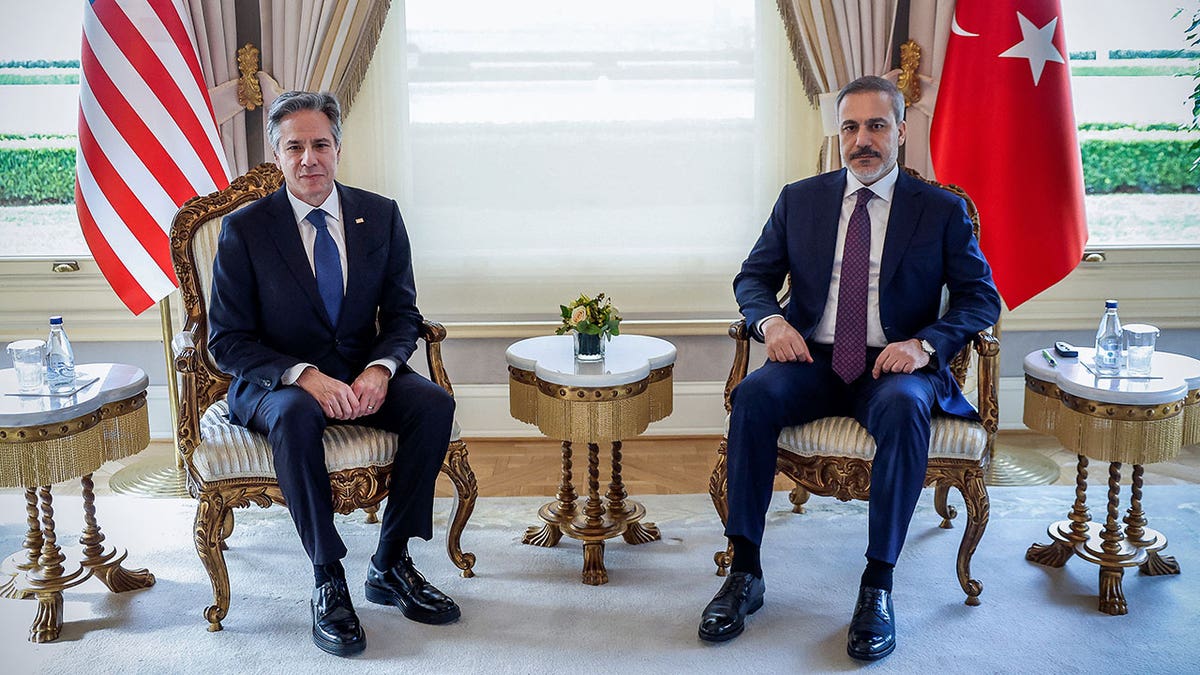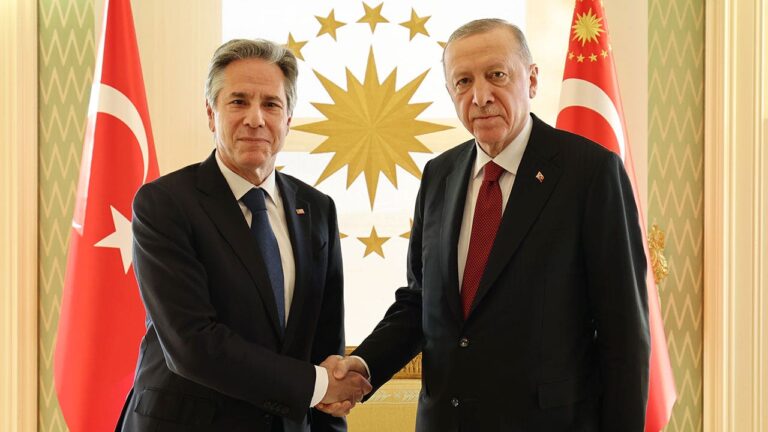U.S. Secretary of State Antony Blinken on Saturday called on Middle East nations to use their influence over extremist groups in the region to contain the conflict in Gaza and prevent “an endless cycle of violence.”
Blinken spoke late in the day after he met with top Turkish and Greek officials to start a week-long diplomatic tour aimed at preventing the Israel-Hamas war from escalating into a broader conflict.
The United States’ most senior diplomat told reporters it is in the interest of all Middle East countries to contain the fighting.
“We want to make sure that countries who feel that way are also using their ties, using their influence, using their relationships with some of the actors that might be involved to keep a lid on things, to make sure that we’re not seeing the spread of conflict,” he said before flying to Jordan.
TURKEY DETAINS 33 ACCUSED OF SPYING FOR ISRAEL’S MOSSAD: REPORT
Turkish President Recep Tayyip Erdogan (R) welcomes United States Secretary of State Antony Blinken (L) prior to their meeting at Vahdettin Pavilion in Istanbul, Turkiye on January 06, 2024. (Turkish Presidency/Murat Cetinmuhurdar/Anadolu via Getty Images)
Iran-backed Lebanese terrorist group Hezbollah said Saturday it launched rockets at Israel, and the Jewish state said it struck a “terrorist cell” in response.
Blinken emphasized the importance of maintaining security in northern Israel, along the border with Lebanon.
“From the perspective of Israel, it’s clearly not interested, does not want escalation … but they also have to be fully prepared to defend themselves,” he said.
The State Department chief warned that if the Israel-Hamas war expands, the outcome would be “an endless cycle of violence … and lives of insecurity and conflict for people in the region.”
IDF RAID ALLEGED HAMAS COMPOUND INSIDE SCHOOL, FIND TERRORISM-THEMED PUZZLE, TOYS AMONG WEAPONS CACHE

U.S. Secretary of State Antony Blinken meets with Turkish Foreign Minister Hakan Fidan at Vahdettin, a private residence of the Presidency, in Istanbul, Turkey, January 6, 2024. (REUTERS/Evelyn Hockstein/Pool)
Earlier Saturday, Blinken spoke with Turkish President Recep Tayyip Erdogan after meeting with Foreign Minister Hakan Fidan earlier.
Blinken and Fidan discussed the war and the humanitarian crisis in Gaza, as well as Turkey’s process to ratify Sweden’s membership of NATO, Turkey’s foreign ministry said in a statement.
The Biden administration hopes to convince Ankara to influence other Arab states against entering the Israeli-Palestinian conflict, seeking to prevent a wider and more costly war.
A senior State Department official traveling with Blinken, who spoke on condition of anonymity, told Reuters that Turkey has relationships with many parties in the conflict, a reference to its ties to U.S. adversary Iran and Hamas.
Erdogan has strongly opposed Israel’s military operation in Gaza and accused the Jewish state of committing war crimes against the 2.3 million Palestinians who live there. After the Oct. 7 attack on Israel, Erdogan denied that Hamas is a terrorist organization, calling it a “liberation group” that is “waging a battle to protect its land and people.”
HERE’S WHAT TO KNOW ABOUT TURKEY’S DECISION TO MOVE FORWARD WITH SWEDEN’S BID TO JOIN NATO

U.S. Secretary of State Antony Blinken boards a plane to travel to Crete, in Istanbul, Turkey, January 6, 2024. (REUTERS/Evelyn Hockstein/Pool)
Hamas terrorists killed 1,200 people, mostly civilians, and took 240 hostages back to Gaza in the attacks.
Israel’s retaliatory war to eliminate Hamas’ governing ability has killed 22,700 Palestinians, according to the Hamas-led Gaza health ministry. However, Hamas officials do not distinguish between civilian and military casualties and their reported figures cannot be independently verified.
TURKISH LAWMAKER WHO SUFFERED HEART ATTACK AFTER SAYING ISRAEL WILL SUFFER ‘THE WRATH OF GOD’ HAS DIED
The renewed conflict in Gaza has spilled into the West Bank and been aggravated by Hezbollah terrorists firing rockets at Israeli forces along the northern border with Lebanon and Houthi rebels in Yemen attacking shipping vessels in the Red Sea.
Blinken’s mission is to persuade Arab states to stop these attacks and make progress in talks on how Gaza could be governed if and when Israel achieves its aim of eradicating Hamas.
Washington wants regional countries, including Turkey, to play a role in reconstruction, governance and potentially security in the Gaza Strip, which has been run by Hamas since 2007, the official told Reuters.
Blinken is next scheduled to travel to Greece and speak with officials there before bouncing around the Middle East with planned stops in Jordan, Saudi Arabia, the United Arab Emirates, Qatar, Egypt and Israel over the next week.
Reuters contributed to this report.



